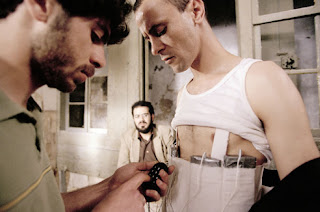Hany Abu-Assad
2005
“Death is better then inferiority” Jamal says to Said, who together with long time friend Khaled, carries a time bomb within their fragile bodies with the purpose and with the hope of getting nearer to a revolution that will declare the equality of the Palestinian authorities as with the economically and politically stronger Israel. “Paradise Now” looks into the soul of what the western world calls “terrorists” and what this film calls “humans”, “faithful humans”.
Everything is well planned, or supposed to be well planned. Said and Khaled will travel from their home town Nablus (part of the Palestinian Authority) to Tel Aviv (a modernized or westernized city in Israel where buildings are as tall as the sky’s horizons, and billboards with faces a hundred times bigger). One of them will go detonate their time bomb and as the police and crowd get occupied in the dreadful scene, the other one will go blow up the second bomb. But this never happened on the way to a covert passing from Palestine to Israel Palestine
Simply structured, complicatedly substantiated, eye-poppingly cinematographed, “Paradise Now” could never go less than an interesting film. The Israel-Palestine conflict is one of those that the whole world is watching, making the subject matter a larger than life production but its detour to the personal perspective makes this divergence ten times a human. I am not going to say that it is the best movie when it comes to stories about humans seeking to live a life that will make them feel like a human, but what this film has is its aggressiveness for such expedition. These aggressiveness and rebellion furthermore, are well-kept by their seamless faith to Allah. If the “terrorists”, in Western terms, are having these soul-deep motivations, then that only means that these people can get as formidable as any a strong a nation. Then that would simply mean that the economically and politically superior nation will never ever have a field day conquering these people.
The story takes place in three days, ironically juxtaposed with the century old conflict these two nations had been having way back Ottoman and British rule. This transient story frame coheres with what the film devotedly hopes for—a paradise for their smothered Palestine
The camera movement and philosophy though is not as smooth and clean as the cinematography of Coen brother’s movies, which I really adore. But Assad’s film with cinematographer Antoine Heberle is beautifully sparkling that from beginning to end of the film “paradise” has just been achieved visually. The afternoon sunshine is scorchingly exquisite as it burns the red-skinned actors. The yellowish afternoon and sky-bluish morning and even the dark night are competitively differentiated yet threaded by a single edge of being paradise-like.
The film is one of the few movies that try to reintroduce an understood group of people showing who they are, what they believe, and why they are doing what they do. Though not any film could completely explain and answer what the whole world knows, this movie speaks of only one thing—of paradise; of a place that will compensate for all the sufferings they have gone through here in the planet that seems to be very kind to other people who happen to be their oppressors. The film doesn’t proclaim they have the correct thing in mind, Khaled has even doubted his belief in what he used to be fighting for all his life, after a peaceful piece of advise from Suha Azzad. Abu-Assad in his speech receiving the Golden Globe Award for Best Foreign Language Film in 2005 said that he is hoping that the award is a recognition for the equality Palestine
“Paradise Now” is a pure film, and I want it to put it is as simple as that. You will understand my simplicity of conclusion if you watch it.



No comments:
Post a Comment